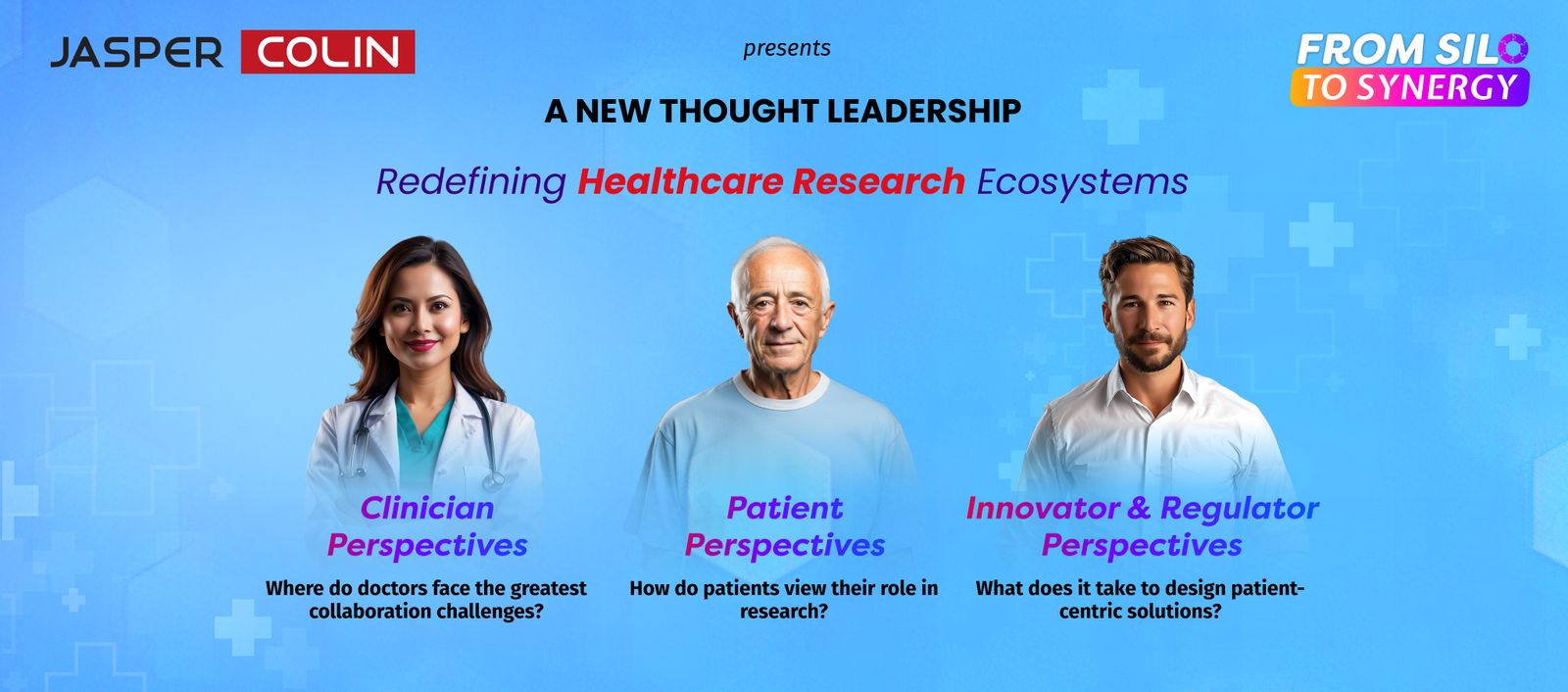From Silos to Synergy: Redefining Healthcare Research Ecosystems
In healthcare, innovation often occurs in isolation. Clinicians, innovators, and patients push progress separately. Breakthroughs happen but are rarely aligned, and insights are gathered but seldom shared.

In the complex world of healthcare, innovation often operates in isolation. Clinicians, innovators, and patients each push the boundaries of progress - yet too often, they do so from separate corners of the ecosystem. Breakthroughs are achieved but seldom aligned. Insights are gathered, but rarely shared.
At Jasper Colin, we recognized this fragmentation as a deeper structural challenge - one that slows innovation, weakens data integrity, and distances research from real human impact. We saw a need to create meaningful connections between driving care, designing technology, and experiencing treatment firsthand. That vision became the foundation of Silos to Synergy; our new thought leadership initiative aimed at redefining how healthcare research connects across its many moving parts.
1. The Disconnect: When Innovation Operates in Isolation
Our exploration began with a clear problem - progress was happening everywhere, yet communication was happening nowhere.
Clinicians were overextended, balancing patient care and research responsibilities, often excluded from early-stage innovation discussions.
Manufacturers and innovators were advancing technologies faster than validation or adoption frameworks could catch up.
Patients, the ultimate stakeholders, were reduced to subjects rather than contributors - their lived experiences undervalued and under-measured.
This revealed a stark truth: healthcare silos weren’t just physical or departmental; they were philosophical. Transformation wasn’t lacking effort - it was lacking alignment.
2. The Clinicians’ Silo: Restoring Trust and Transparency in Modern Medicine
At the heart of healthcare are those who heal - and their voices set the tone for transformation.
Arthur Wallace, Chief of Anesthesia Service, brought decades of clinical leadership to the discussion, emphasizing how evolving technologies demand not just adoption, but accountability in patient outcomes.
Anthony Feghali, Director and Vascular Surgeon, reflected on the growing complexity of data integration in clinical practice - how surgeons today must navigate both human precision and algorithmic insight.
Robert T. Grant, Clinical Associate Dean and Plastic Surgeon, explored the changing ethics of research participation, highlighting the need for transparency and open communication between clinicians and patients during trials and evaluations.
Together, they painted a compelling picture of a medical landscape in transition - one where trust, clarity, and communication are becoming as vital as clinical skill.
Watch to catch a glimpse of what they bring to the table - Exploring the intersection of trust, transparency, and transformation in modern clinical care.
3. The Innovators’ Silo: When Science Meets Human Imagination
Innovation in healthcare doesn’t happen in labs alone - it happens where ideas meet empathy.
Brandon Lucke-Wold, Neuro-endovascular Surgeon and Researcher, spoke about bridging the worlds of surgery and design - how innovation is only meaningful when it simplifies complexity for both doctor and patient.
Albero Abate, Strategic & Innovation Marketing Director, brought a European perspective, sharing how human-centered innovation is driving the next generation of connected medical devices and intelligent diagnostics.
Arthur Wallace - returning as a research collaborator - reinforced that innovation cannot exist in isolation; it thrives when grounded in clinical validation and end-user understanding.
Their dialogue revealed a universal truth: true innovation isn’t about creating technology for medicine - it’s about creating technology that listens to medicine.
Dive into the trailer here to listen to their voices - Where science, empathy, and real-world intelligence come together to reimagine the future of healthcare innovation.
4. The Patient Silo: From Lived Experience to Digital Empowerment
In the final conversation, we turned to the voice that completes the circle - the patient.
Thomas Bartlett, Patient Advocate and Digital Health Advisor, shared his deeply personal journey with myasthenia gravis, a rare neuromuscular disorder. Once an athlete, he found himself re-learning movement, resilience, and self-awareness through technology. His advocacy today centers on using intelligent wearables, AI-driven diagnostics, and voice analytics to empower patients to “participate in their health automagically,” as he describes it.
His story reminded us that data is not just numerical - it’s emotional. It represents stories, struggles, and small victories that shape medical progress. Bartlett’s insights reaffirmed that healthcare’s future lies in designing systems that see the patient not as a datapoint, but as a decision-maker.
Catch a glimpse of his conversation here - A moving reflection on resilience, data, and the redefinition of patient-centric innovation.
5. The Outcome: Intelligence Beyond the Ordinary
The result was more than conversation; it was connected to intelligence.
Through Silos to Synergy, we identified how collaboration between clinicians, innovators, and patients can accelerate the translation of ideas into real-world impact.
We discovered that:
Trust is the new data currency - clinicians and patients value transparency and authenticity over information overload.
Empathy is measurable - when patient narratives are integrated into design, adoption rates and participation rise.
Speed and quality can coexist - with the right frameworks; credible voices can be engaged rapidly without compromising depth.
6. The Impact: Building Bridges That Redefine Healthcare
By connecting voices that rarely converge, we reframed how healthcare research can function - not as a process of extraction, but as a collaboration of understanding. We demonstrated Jasper Colin’s ability to deliver speed, quality, and trust - even within the world’s most complex and closed professional networks.
Because in the future of healthcare, breakthroughs won’t emerge from silos of expertise. They will emerge from the synergy of shared purpose.
And at Jasper Colin, we’re proud to be the ones building that bridge through our primary research capabilities and the ability to find, recruit and engage most difficult and hard to reach groups.
Reach out to us at sales@jaspercolin.com for free access to these expert talks and our analysis.
Jasper Colin is an end to end vertically integrated research and analytics services provider specialized in engaging hard to reach audience groups supplemented by rigorous multi-method research framework. Their integrated approach enhances speed, quality, and experience for clients across various industries.


